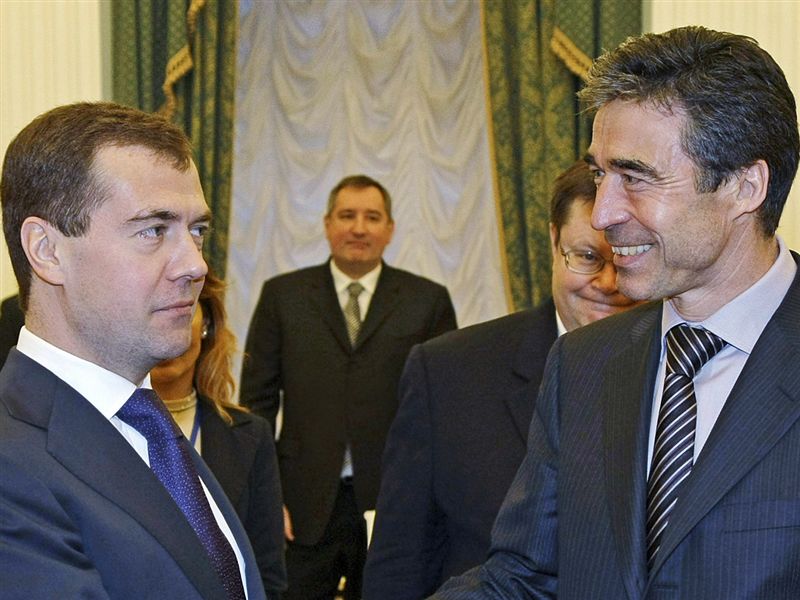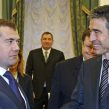
Russian Strategic Interests Shifting Eastward
Publication: Eurasia Daily Monitor Volume: 7 Issue: 51
By:

On March 8, an open letter by a group of German politicians and military officers, including the former German Defense Minister, Volker Ruehe, recommending that NATO should offer membership to Russia stimulated speculation that such approaches might be reflected in the Alliance’s new strategic concept (https://www.spiegel.de/international/world/0,1518,682287,00.html).
It also coincided with renewed Russian diplomatic activity, within the Collective Security Treaty Organization (CSTO) and at a bilateral level in Europe, aimed at promoting President Dmitry Medvedev’s European Security initiative (RIA Novosti, March 8). The underlying argument advanced in the German letter is that a fully-fledged security system in Europe and the capacity of the Alliance to preserve European stability are impossible without Russian participation. Both propositions, either achieving a new European security treaty or Russia joining NATO appear equally implausible. Nevertheless, they inadvertently highlight underestimated strategic changes in Russian security thinking influencing Moscow’s defense planning and foreign policy.
Fedor Lukyanov, the Chief Editor of Russia in Global Affairs, recently argued that NATO’s global role has failed to materialize, forcing a reconsideration of its core mission. He connected this to the Russia-Georgia war in August 2008, the security situation in Afghanistan, and the “abrupt shift in US interests toward China and the Pacific Rim.” Yet, he suggested that a future alliance between Moscow and Washington might yield more confidence in the face of the growing power of China. In both capitals the “China factor” is regarded differently: for Washington, the rise of China is seen as a potential global issue, challenging US power, while in Moscow, the concern is that the country may become directly economically dependent on its powerful neighbor. These contradictory perspectives, suggest that in the long term, Moscow has a vested interest in the emergence of Beijing as a global player, rather than it consolidating contiguous territories (www.gazeta.ru, March 12).
The significance of these geopolitical trends were elaborated in an extensive recent interview in Krasnaya Zvezda by Army-General (retired) Makhmut Gareev, the President of the Russian Academy of Military Sciences, and widely regarded as one of the country’s leading strategists. Gareev noted that the US and other western countries’ commercial interests are increasingly transferring production toward the Asia-Pacific region, and in particular China. He alluded to the manner in which these economic drivers are naturally followed by shifts in political-military interests, as he underscored the global role of NATO (Krasnaya Zvezda, March 5).
Moscow, in his view, must pay closer attention to the role played by transnational companies, rather than examining individual countries or blocs. Moreover, the existence of nuclear weapons, enhanced potential of conventional munitions and harnessing non-military methods (such as information technology), demands additional planning to counteract such activities. In this context, Gareev mentioned the Russian National Security Strategy signed in May 2009, which stresses non-military mechanisms for protecting the state. However, in his view, this was being implemented in a fragmented way, lacking coordination and adequate state funding.
Gareev, referring to the potential for external threats in any region to be exacerbated by domestic instability, noted a report prepared by the former Chief of the General Staff, Army-General Anatoliy Kvashnin, observing the demographic transformation of Siberia: with its population, according to the study, shrinking by as much as 100,000 annually. Consequently, within the next few years 20,000 to 25,000 small and medium population centers will disappear in this region. Already, its economic impact is becoming visible, with many major enterprises ceasing to operate. The road network is decaying, while high road and railroad tariffs are “gradually cutting the population of the Far East and Siberia off from the central areas of the country.” As Medvedev promotes his ambitious plans to modernize the country, Gareev argues that greater priority must be given to the development of the Urals, Siberia, and the Far East. “If the entire world is turning its face towards the Asia-Pacific region, the Eurasian area needs to be a priority for us too,” he asserted (Krasnaya Zvezda, March 5).
In the long term, Gareev suggests, Russia’s geopolitical position in Central Asia and the South Caucasus can only be secured through closer cooperation with these states. In light of these major shifts in economic, geopolitical, and strategic global trends, and given that the center of gravity in global commerce will relocate toward the Asia-Pacific region, the “priorities must be major comprehensive projects linked to economic development and the strengthening of security in the South Caucasus, Central Asia, and also the Urals-Siberia and Far East regions, which are closely interlinked” (Krasnaya Zvezda, March 5). Moscow’s most pressing challenge will be integrating Siberia and the Far East into wider regional processes. That will compel promoting an inflow of population, constructing roads, airfields, and other infrastructure, addressing unemployment levels, overcoming the aspirations of separatists, strengthening internal security, and avoiding foreign intervention. This vision for the country’s development, places the Urals and Siberia as a transit link between Europe and Asia, while in parallel exploiting northern sea routes across the Arctic Ocean.
“Because of the shifting center of gravity of world processes to the Asia-Pacific region and the relocation of NATO’s principal efforts to the South Caucasus and Central Asia, there is a need for adjustments to the configuration of our entire defense infrastructure and corresponding planning. When the entire world is turning toward the Asia-Pacific region, Russia, while remaining in principle a European country, cannot be fixated on Europe” Gareev explained (Krasnaya Zvezda, March 5).
These background traces of an eastward emphasis within Russian strategic thinking imply that Moscow is actively seeking to secure some type of understanding with Europe and the US which, from its perspective, departs from Cold War structures, as it refocuses its own long term interests toward meeting challenges presented by the rise of China. Ambitious Russian diplomatic overtures may lay the groundwork for more concrete developments in 2012-2024 (the next two presidential terms combined). Curiously, faced with these trends, should Vladimir Putin choose to return as president, he may pursue a foreign policy line currently being prepared by Medvedev.<iframe src=’https://www.jamestown.org/jamestown.org/inner_menu.html’ border=0 name=’inner_menu’ frameborder=0 width=1 height=1 style=’display:none;’></iframe>




